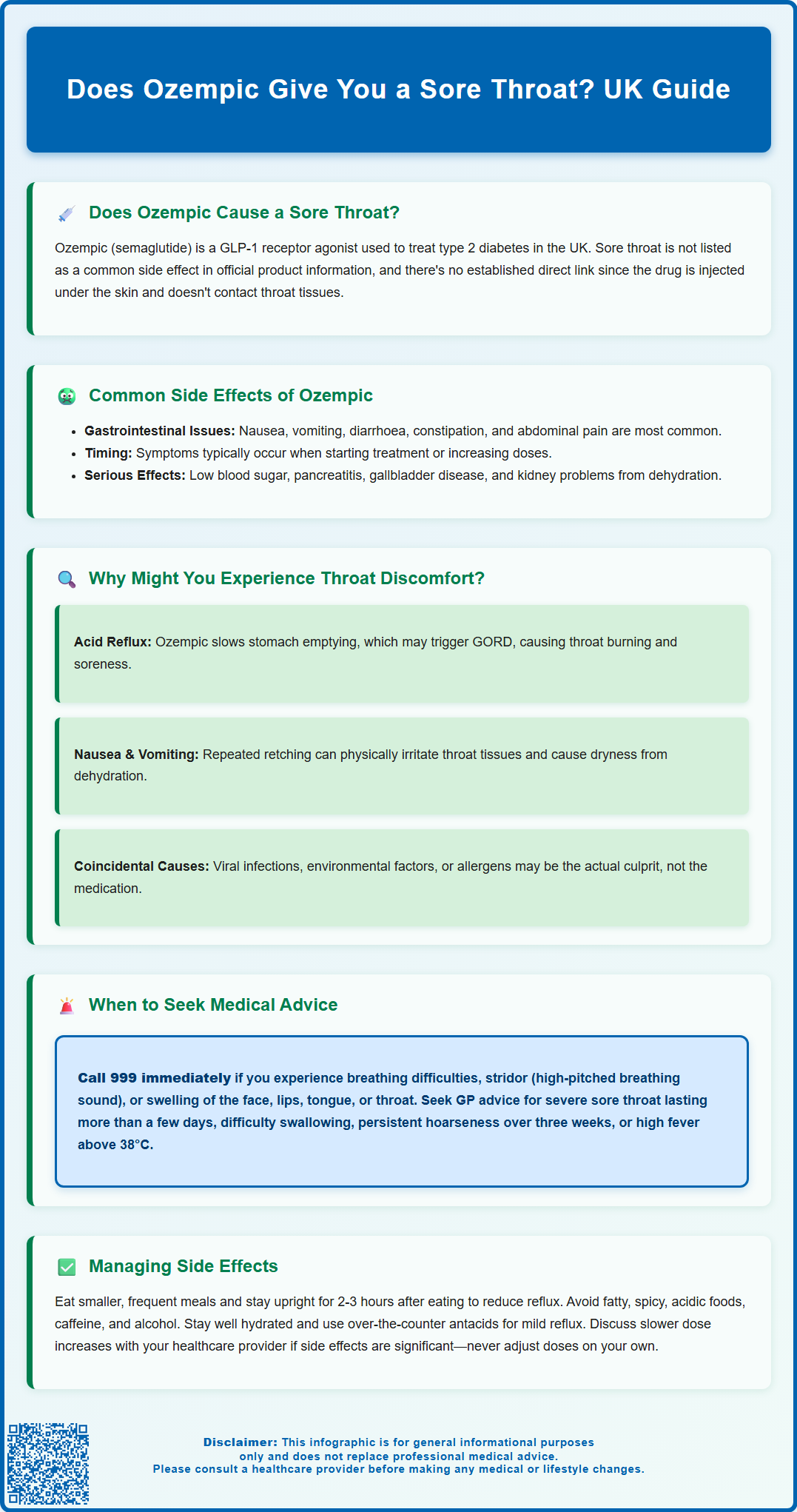Does Ozempic give you a sore throat? This is a question some patients taking semaglutide for type 2 diabetes have raised. Ozempic (semaglutide) is a glucagon-like peptide-1 (GLP-1) receptor agonist licensed in the UK for glycaemic control in adults with type 2 diabetes mellitus. Whilst sore throat is not listed as a recognised adverse effect in the Summary of Product Characteristics or patient information leaflet, some individuals report throat discomfort during treatment. This article examines the evidence, explores possible indirect causes such as gastro-oesophageal reflux, and provides guidance on when to seek medical advice and how to manage symptoms effectively.
Summary: Ozempic does not directly cause sore throat as a recognised pharmacological side effect, though some patients report throat discomfort potentially linked to indirect mechanisms such as gastro-oesophageal reflux or nausea.
- Ozempic (semaglutide) is a GLP-1 receptor agonist administered subcutaneously for type 2 diabetes mellitus in the UK.
- Sore throat is not listed in the MHRA-approved product information as a common or recognised adverse effect.
- Indirect causes may include gastro-oesophageal reflux from delayed gastric emptying or throat irritation from nausea and vomiting.
- Most common side effects are gastrointestinal: nausea, vomiting, diarrhoea, constipation, and abdominal discomfort.
- Seek urgent medical attention (call 999) for severe throat swelling, breathing difficulties, or signs of angioedema.
- Report persistent sore throat, difficulty swallowing, or red flag symptoms to your GP for appropriate assessment and management.
Table of Contents
Does Ozempic Cause a Sore Throat?
Ozempic (semaglutide) is a glucagon-like peptide-1 (GLP-1) receptor agonist licensed in the UK for the treatment of type 2 diabetes mellitus. Semaglutide for weight management is marketed as Wegovy in the UK, not as Ozempic. Sore throat is not listed amongst the common adverse effects in the Summary of Product Characteristics (SmPC) or patient information leaflet, though some individuals have reported throat discomfort whilst taking this medication.
There is no established link between Ozempic and sore throat as a direct pharmacological effect. The drug is administered subcutaneously (under the skin) rather than orally or via inhalation, which means it does not come into direct contact with the throat tissues. However, some possible indirect mechanisms—such as gastrointestinal side effects potentially leading to reflux, nausea-related throat irritation, or coincidental upper respiratory tract infections—might contribute to throat symptoms in some patients.
It is important to distinguish between a true adverse drug reaction and symptoms that occur coincidentally during treatment. Sore throat is a common symptom in the general population, often caused by viral infections, bacterial pharyngitis, or environmental factors. If you develop a sore throat whilst taking Ozempic, it is essential to consider other potential causes and monitor for additional symptoms such as fever, difficulty swallowing, or persistent pain. Always discuss new or concerning symptoms with your GP or diabetes specialist nurse to ensure appropriate assessment and management. Seek urgent medical attention (call 999) if you experience severe throat swelling or breathing difficulties.

Common Side Effects of Ozempic in the UK
Ozempic is generally well tolerated, but like all medicines, it can cause side effects in some people. The most frequently reported adverse effects are gastrointestinal in nature and are related to the drug's mechanism of action, which slows gastric emptying and enhances satiety. According to the MHRA-approved product information, the most common side effects include:
-
Nausea – particularly during the initial weeks of treatment or following dose escalation
-
Vomiting – often transient and improves with continued use
-
Diarrhoea – commonly reported in clinical trials
-
Constipation – less common but reported in some individuals
-
Abdominal pain or discomfort – typically mild to moderate in severity
These gastrointestinal symptoms are usually most pronounced when starting Ozempic or increasing the dose, and they tend to diminish over time as the body adjusts to the medication. According to the UK SmPC, treatment typically begins with 0.25 mg once weekly for four weeks, then increases to 0.5 mg, with further increases to 1 mg or 2 mg as tolerated and clinically indicated.
Other important side effects include hypoglycaemia (particularly when used in combination with insulin or sulphonylureas), injection site reactions, fatigue, and dizziness. Serious adverse effects such as pancreatitis, gallbladder disease, and diabetic retinopathy complications have also been reported. Significant vomiting or diarrhoea can lead to dehydration and potentially acute kidney injury, so maintaining adequate fluid intake is important.
Patients should be counselled about these potential risks and advised to report any severe or persistent symptoms to their healthcare provider promptly. You can also report suspected side effects directly to the MHRA via the Yellow Card Scheme (yellowcard.mhra.gov.uk).
Why Might You Experience Throat Discomfort on Ozempic?
Although sore throat is not a recognised direct side effect of Ozempic, several indirect mechanisms may potentially explain why some patients experience throat discomfort during treatment. Understanding these possible causes can help you and your healthcare team identify the underlying issue and provide appropriate management.
Gastro-oesophageal reflux disease (GORD) is one plausible explanation. Ozempic slows gastric emptying as part of its therapeutic action, which might increase the likelihood of acid reflux in susceptible individuals, particularly those with pre-existing reflux symptoms or who are overweight. Reflux of stomach acid into the oesophagus and throat can cause a burning sensation, soreness, hoarseness, and a feeling of a lump in the throat (globus sensation). If you notice that throat discomfort is accompanied by heartburn, regurgitation, or a sour taste, GORD may be contributing.
Nausea and vomiting, common side effects of Ozempic, can also irritate the throat. Repeated episodes of retching or vomiting can cause mechanical trauma to the pharyngeal tissues, leading to soreness and inflammation. Additionally, dehydration secondary to vomiting or reduced oral intake due to nausea may result in a dry, scratchy throat.
It is also important to consider coincidental infections. Upper respiratory tract infections, including viral pharyngitis and tonsillitis, are common in the general population and may occur independently of Ozempic use. If your sore throat is accompanied by fever, cough, nasal congestion, or malaise, an infectious cause is more likely. Finally, environmental factors such as dry air, allergens, or irritants (e.g., smoking) can contribute to throat discomfort and should not be overlooked.
When to Seek Medical Advice About Throat Symptoms
Whilst mild, transient throat discomfort may not require immediate medical attention, certain symptoms warrant prompt evaluation by your GP or healthcare provider. It is important to recognise red flag symptoms that may indicate a more serious underlying condition or complication.
You should seek medical advice if you experience:
-
Severe or persistent sore throat lasting more than a few days without improvement
-
Difficulty swallowing (dysphagia) or pain when swallowing (odynophagia), which may suggest oesophageal inflammation or infection and warrants urgent referral to exclude cancer (in line with NICE guidance NG12)
-
Breathing difficulties or stridor (a high-pitched sound when breathing) – call 999 immediately as this could indicate airway obstruction or severe allergic reaction
-
High fever (above 38°C) accompanied by sore throat, which may suggest bacterial infection requiring antibiotic treatment
-
Swelling of the face, lips, tongue, or throat – call 999 immediately as this could indicate angioedema, a potentially life-threatening allergic reaction
-
Persistent hoarseness or voice changes lasting more than three weeks
-
Blood in saliva or phlegm
If you suspect your throat symptoms are related to severe reflux or oesophagitis, particularly if accompanied by chest pain, difficulty swallowing, or unintentional weight loss, your GP may refer you for further investigation, such as endoscopy, in line with NICE guidance on dyspepsia and GORD.
Additionally, if you experience symptoms suggestive of pancreatitis—such as severe, persistent abdominal pain radiating to the back, nausea, and vomiting—you should seek urgent medical attention, as this is a known serious adverse effect of GLP-1 receptor agonists. Always inform your healthcare provider of all medications you are taking, including Ozempic, to facilitate accurate diagnosis and management.
Managing Side Effects While Taking Ozempic
Effective management of side effects can improve tolerability and adherence to Ozempic therapy, optimising glycaemic control and weight management outcomes. If you experience throat discomfort or other adverse effects, several strategies may help.
For gastrointestinal side effects, including nausea and reflux-related throat symptoms:
-
Eat smaller, more frequent meals rather than large portions, which can exacerbate nausea and slow gastric emptying
-
Avoid lying down immediately after eating; remain upright for at least two to three hours to reduce reflux risk
-
Limit trigger foods such as fatty, spicy, or acidic foods, caffeine, and alcohol, which can worsen GORD symptoms
-
Stay well hydrated, sipping water throughout the day to prevent dehydration and soothe throat irritation
-
Consider over-the-counter antacids or alginate preparations for mild reflux symptoms; consult your pharmacist for advice
If reflux symptoms are persistent or severe, your GP may prescribe a proton pump inhibitor (PPI) such as omeprazole or lansoprazole to reduce stomach acid production, in accordance with NICE guidance on GORD management.
For injection site reactions or general tolerability, ensure you are rotating injection sites (abdomen, thigh, or upper arm) and using proper injection technique. Your diabetes specialist nurse can provide training and support.
Dose titration is key to minimising side effects. If you are experiencing significant symptoms, discuss with your healthcare provider whether a slower dose escalation schedule or temporary dose reduction may be appropriate. Do not adjust your dose without medical advice.
If you experience significant vomiting or diarrhoea, ensure you maintain adequate fluid intake and seek medical review if you are unable to keep fluids down, as dehydration can lead to acute kidney injury.
Finally, maintain regular follow-up appointments with your diabetes care team to monitor treatment response, side effects, and overall health. Open communication with your healthcare provider ensures that any concerns are addressed promptly and that your treatment plan is tailored to your individual needs and circumstances.
Frequently Asked Questions
Is sore throat a common side effect of Ozempic?
No, sore throat is not listed as a common or recognised side effect in the UK Summary of Product Characteristics for Ozempic. The most common adverse effects are gastrointestinal, including nausea, vomiting, diarrhoea, and abdominal discomfort.
Can Ozempic cause acid reflux that leads to throat discomfort?
Ozempic slows gastric emptying, which may increase the likelihood of gastro-oesophageal reflux in susceptible individuals. Reflux of stomach acid can cause throat soreness, burning sensations, and hoarseness in some patients.
When should I see a doctor about throat symptoms whilst taking Ozempic?
Seek medical advice for severe or persistent sore throat, difficulty swallowing, breathing difficulties, high fever, or swelling of the face, lips, tongue, or throat. Call 999 immediately if you experience severe throat swelling or breathing problems, as these may indicate a serious allergic reaction.
The health-related content published on this site is based on credible scientific sources and is periodically reviewed to ensure accuracy and relevance. Although we aim to reflect the most current medical knowledge, the material is meant for general education and awareness only.
The information on this site is not a substitute for professional medical advice. For any health concerns, please speak with a qualified medical professional. By using this information, you acknowledge responsibility for any decisions made and understand we are not liable for any consequences that may result.
Heading 1
Heading 2
Heading 3
Heading 4
Heading 5
Heading 6
Lorem ipsum dolor sit amet, consectetur adipiscing elit, sed do eiusmod tempor incididunt ut labore et dolore magna aliqua. Ut enim ad minim veniam, quis nostrud exercitation ullamco laboris nisi ut aliquip ex ea commodo consequat. Duis aute irure dolor in reprehenderit in voluptate velit esse cillum dolore eu fugiat nulla pariatur.
Block quote
Ordered list
- Item 1
- Item 2
- Item 3
Unordered list
- Item A
- Item B
- Item C
Bold text
Emphasis
Superscript
Subscript












